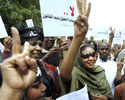
The attention paid to the “Sudan pants case” touched off an interesting debate here in our office, and I thought the insights of some of my colleagues were worth bringing to light outside of our email threads and gchats.
The conversation started when I passed around some recent updates regarding the judge’s decision on Tuesday to postpone Lubna’s trial until September.
While there is certainly no disagreement that Lubna is very courageous to push ahead with her case, despite the trauma that the experience has already and may further cause, a number of my colleagues urged me to take a closer look at the context in which Lubna’s story is unfolding. As one explained:
“This is a classic tactic of Khartoum: create a ‘crisis’ that it knows the international media will latch on to, thereby keeping a crisis like the collapsing peace deal, [which could thrust the country back into war], out of the news. The media takes the bait every time.”
Without a doubt, the societal norms in Sudan, like the subjugation of women and inhumane punishment, that Lubna and her supporters are determined to highlight are very troubling and indeed indicative of the kinds of country-wide reforms that will need to occur for a comprehensive peace process to succeed. But it is also important to acknowledge how the ruling party in Khartoum could seize the opportunity to distract from issues like border demarcation, national elections, and Khartoum’s alleged arming of factions in the South that threaten to derail implementation of the CPA and plunge the country back into full-scale civil war.
I certainly do not want to suggest that the attention to Lubna’s case is not warranted. As a piece, Pants Pants Revolution, in Foreign Policy today highlights, this case is already beginning to touch off an important grassroots movement:
On Tuesday, more than 100 women appeared at the North Khartoum District Courthouse with hand-written signs reading "No more women’s rights violations!" and "Kill me, but don’t suppress me!" Gabralla, the human rights activist, stood proudly in the front row, facing scores of the much-feared policemen carrying batons and AK47s, with riot gear at the ready.
Clearly, Lubna’s bravery has given confidence to other activists like her who now have an opportunity to build a movement in the relative safety of the spotlight that international news coverage lends.
But what seems important to keep in mind is the context in which Lubna’s case has taken center stage. As we follow the case, we must stay alert to what else is happening in the country so as to avoid being manipulated by Khartoum’s opportunistic use of this case as a distraction. As one colleague predicted:
“The government will let this case drag on and on and in the end Khartoum will let Lubna go to show the world how reasonable they are. And they will probably time their decision with a violent crackdown elsewhere. I’ve seen it happen time and again.”

